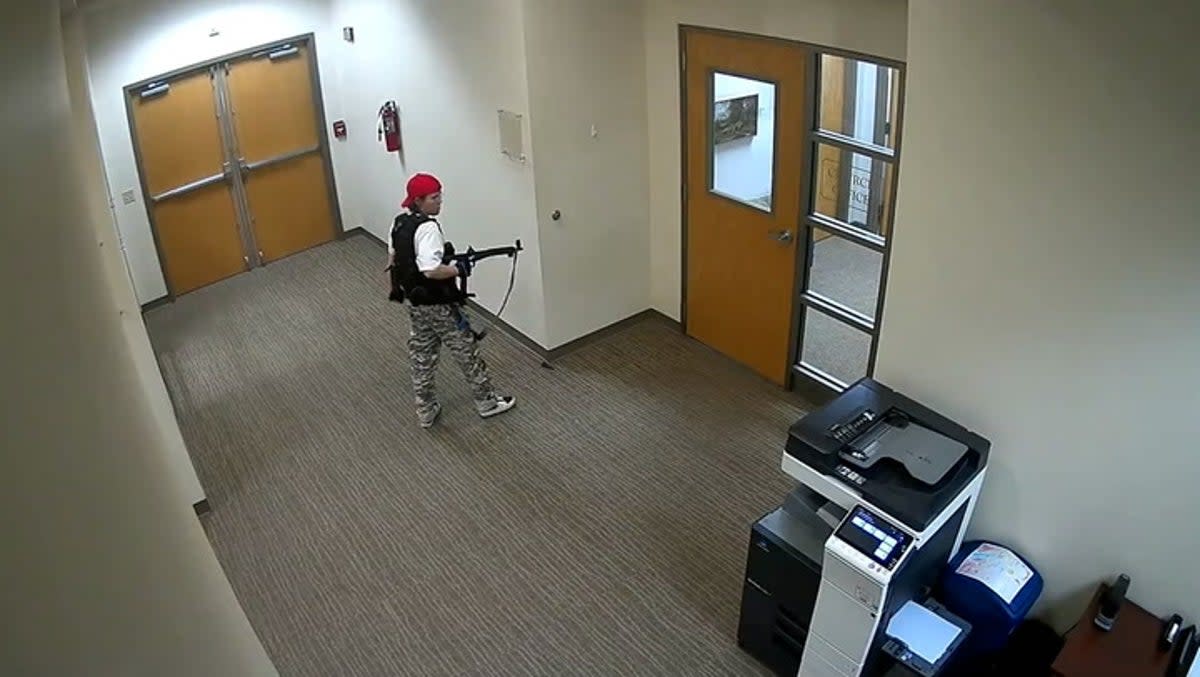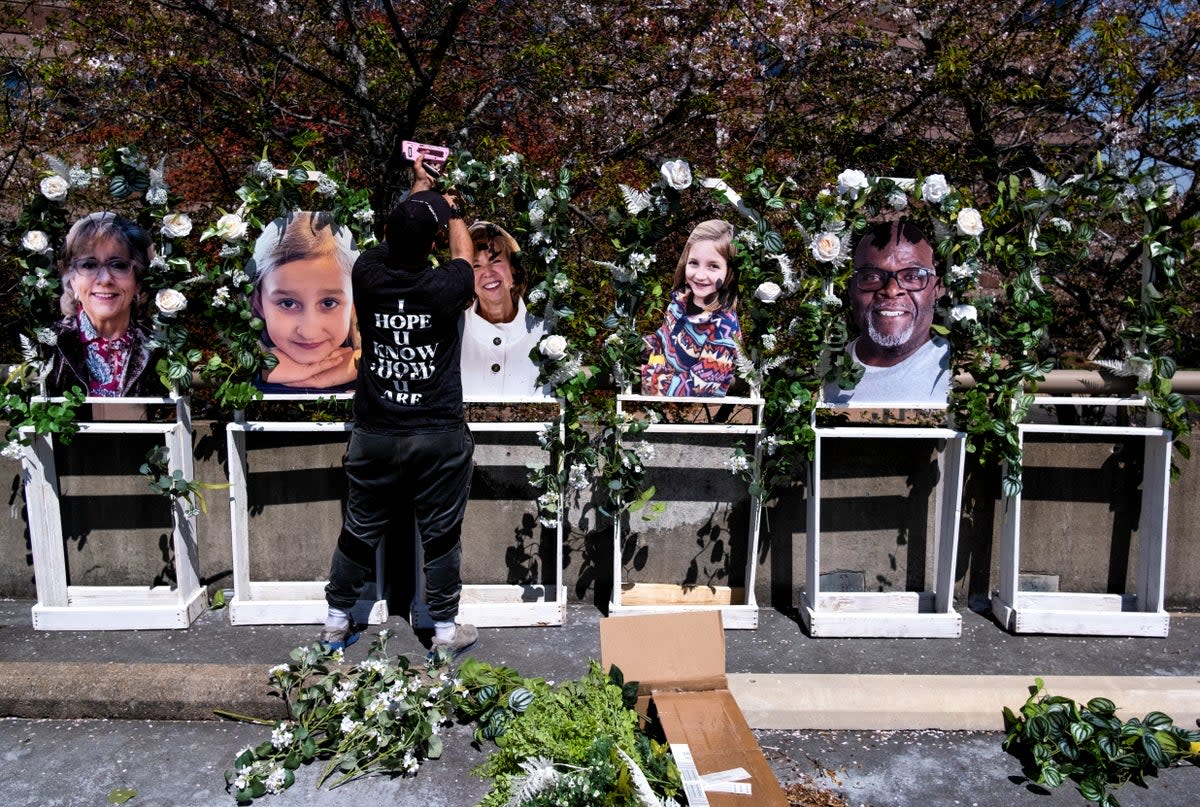Chilling manifesto left behind by Nashville school shooting suspect to be released to public
The chilling manifesto left behind by the Nashville school shooting suspect is set to be released to the public once FBI profilers complete an analysis of its contents.
Audrey Hale, a 28-year-old former student, compiled a manifesto, maps and detailed plans before carrying out Monday’s horror attack at The Covenant School in Nashville, Tennessee.
Six victims – three staff members and three small children – were killed in the mass shooting.
Students Evelyn Dieckhaus, Hallie Scruggs, and William Kinney, all aged nine, headteacher Katherine Koonce, 60, substitute teacher Cynthia Peak, 61, and custodian Mike Hill, 61, all died in the attack.
Police have identified the suspected shooter by their name at birth; Hale reportedly was a transgender man who used he/him pronouns, though law enforcement officials initially described the suspect as a woman in the aftermath of the shooting. Police did not provide another name but on the suspect’s social media accounts they refer to themselves as Aiden.
The attack has been described as both planned and targeted. Police also said they have found evidence suggesting Hale was planning other attacks on other locations.
Nashville Council Member Robert Swope told The New York Post that the FBI’s Behavioral Analysis Unit (BAU) is working with the Metro Nashville Police Department (MNPD) to carry out “a very in-depth analysis” of both the manifesto and “certain aspects of the shooter’s life” as they investigate what led up to the horrific mass murder.
Once criminal profilers have analysed its contents, the manifesto will be shared with the public, said Mr Swope.
“The manifesto is going to be released. It’s just a matter of when,” he said.
“There are some incredibly brilliant psychological minds and psychological analysts combing through her entire life.”

Mr Swope said that Hale had “looked at” carrying out attacks on two other schools, both of which were public.
But he said that Hale appears to gave decided that “the security was too great to do what she wanted to do” and so “she chose a private Christian school, for, probably the reason is that the security is a whole lot less”.
Nashville Police Chief John Drake said on Tuesday that investigators “strongly believe” Hale was planning to carry out other attacks including at a local mall and targeting family members.
“We strongly believe there was going to be some other targets, including maybe family members, and one of the malls here in Nashville,” the police chief said.
“And that just did not happen.”
He said that some maps “pertaining to maybe some thinking about some other incidents” had been discovered during a search of the shooter’s family home, along with other weapons.
The Covenant School was believed to have been singled out for an attack because it had a lower level of security – with no school resource officer – than other locations.
Just after 10am on Monday morning, Hale allegedly drove to the elementary school armed with two assault rifles and a handgun.
There, Hale broke into the school building by shooting through the glass side doors and climbing inside.
Once inside, the shooter stalked the corridors, gunning down victims.
Responding officers fatally shot the assailant at 10.27am – 14 minutes after the first 911 call reporting an active shooter came in and preventing Hale from moving onto any of the other potential targets or locations.

Prior to Monday’s massacre, Hale had been able to legally purchase seven firearms – despite receiving mental health treatment at the time.
In a press conference, Chief Drake said that Hale was under care “for an emotional disorder” and that her family “felt that she should not own weapons”.
The police chief said that Hale’s parents were aware the suspect had purchased one firearm, but believed it had since been sold.
In reality, the 28-year-old had legally purchased seven firearms and hid them around the family home.
Three of those firearms – two assault rifles and a handgun – were used in Monday’s shooting.
Even if Hale’s parents had been aware of the stash of weapons and contacted law enforcement, there is no red flag law in Tennessee that could have been used to take away the firearms.
In the year before the shooting, Hale had made a series of posts on Facebook about the death of someone Hale appeared to regard as a romantic partner.
Art college instructor Maria Colomy, who taught Hale at the Nossi College of Art & Design in Nashville, recalled a Facebook post from the shooter “openly grieving” the individual – a former middle school basketball teammate.
Speaking to The New York Times, Ms Colomy said that Hale had announced the bereavement and asked to be addressed as Aiden and by masculine pronouns from then on.
“She had been openly grieving about that on social media, and during the grieving is when she announced that she wanted to be addressed as a male,” the teacher said.
Then, just minutes before the shooting unfolded, Hale sent some chilling final messages to another former teammate, issuing a dark warning that “something bad is about to happen”.
Averianna Patton said that Hale sent the messages via Instagram at 9.57am on Monday morning, revealing plans to die by suicide and saying that she would soon be reading about the upcoming events “on the news after I die”.
“One day this will make more sense,” Hale wrote.
“I’ve left behind more than enough evidence behind. But something bad is about to happen.”
Ms Patton said she later learned what her friend had done.
Hale – an illustrator and graphic designer who attended Nossi College of Art – did not have any criminal record prior to Monday’s massacre.
On Wednesday night, local residents gathered for a vigil in memory of the victims.
At the vigil, attended by First Lady Jill Biden,young people, parents and other local residents spoke to The Independentabout their frustration that their community is now the latest to be torn apart by gun violence.
If you are experiencing feelings of distress and isolation, or are struggling to cope, the Samaritans offers support; you can speak to someone for free over the phone, in confidence, on 116 123 (UK and ROI), email jo@samaritans.org, or visit the Samaritans website to find details of your nearest branch.
If you are based in the USA, and you or someone you know needs mental health assistance right now, call National Suicide Prevention Helpline on 1-800-273-TALK (8255). The Helpline is a free, confidential crisis hotline that is available to everyone 24 hours a day, seven days a week.
If you are in another country, you can go to www.befrienders.org to find a helpline near you.
